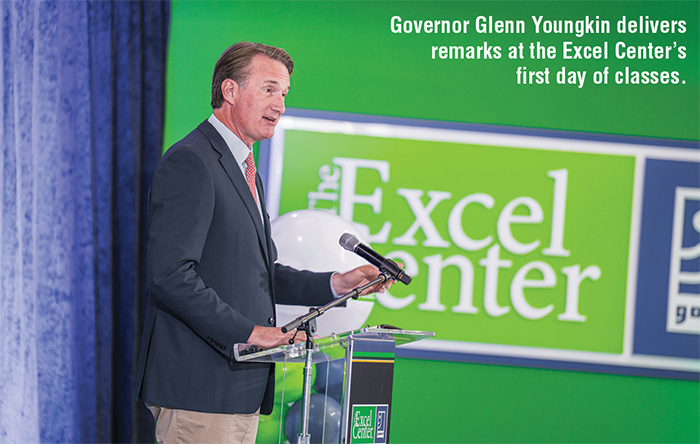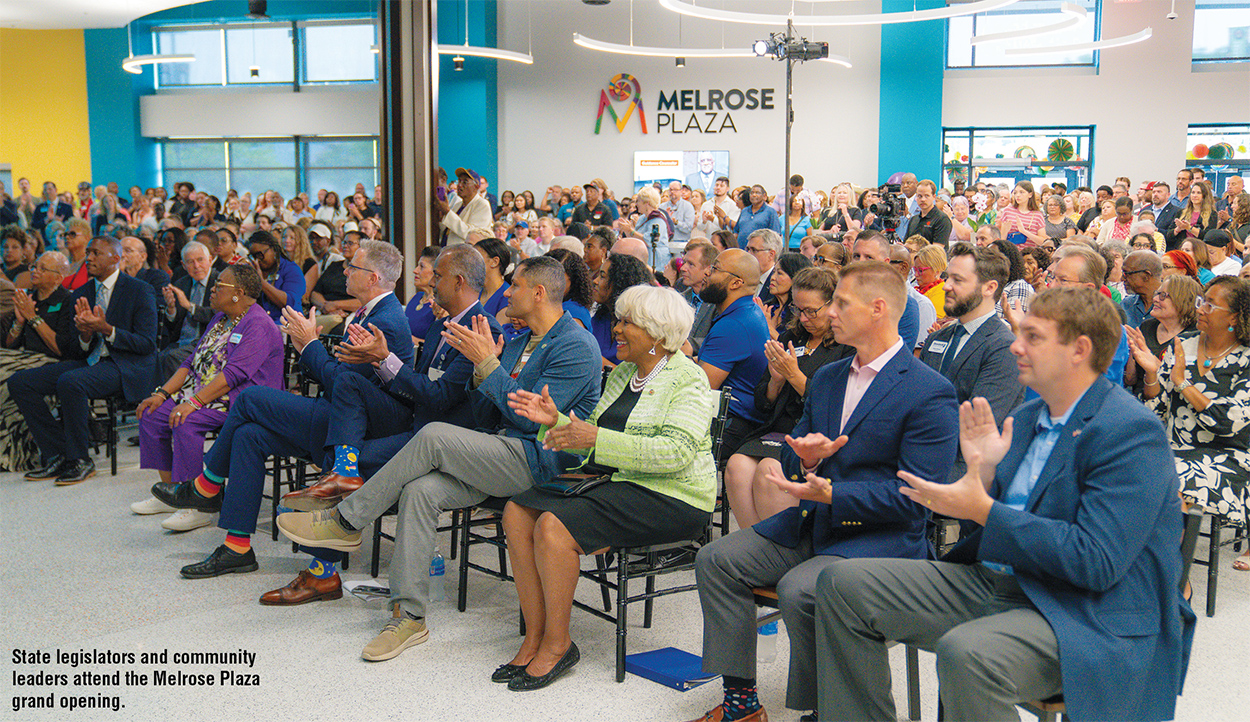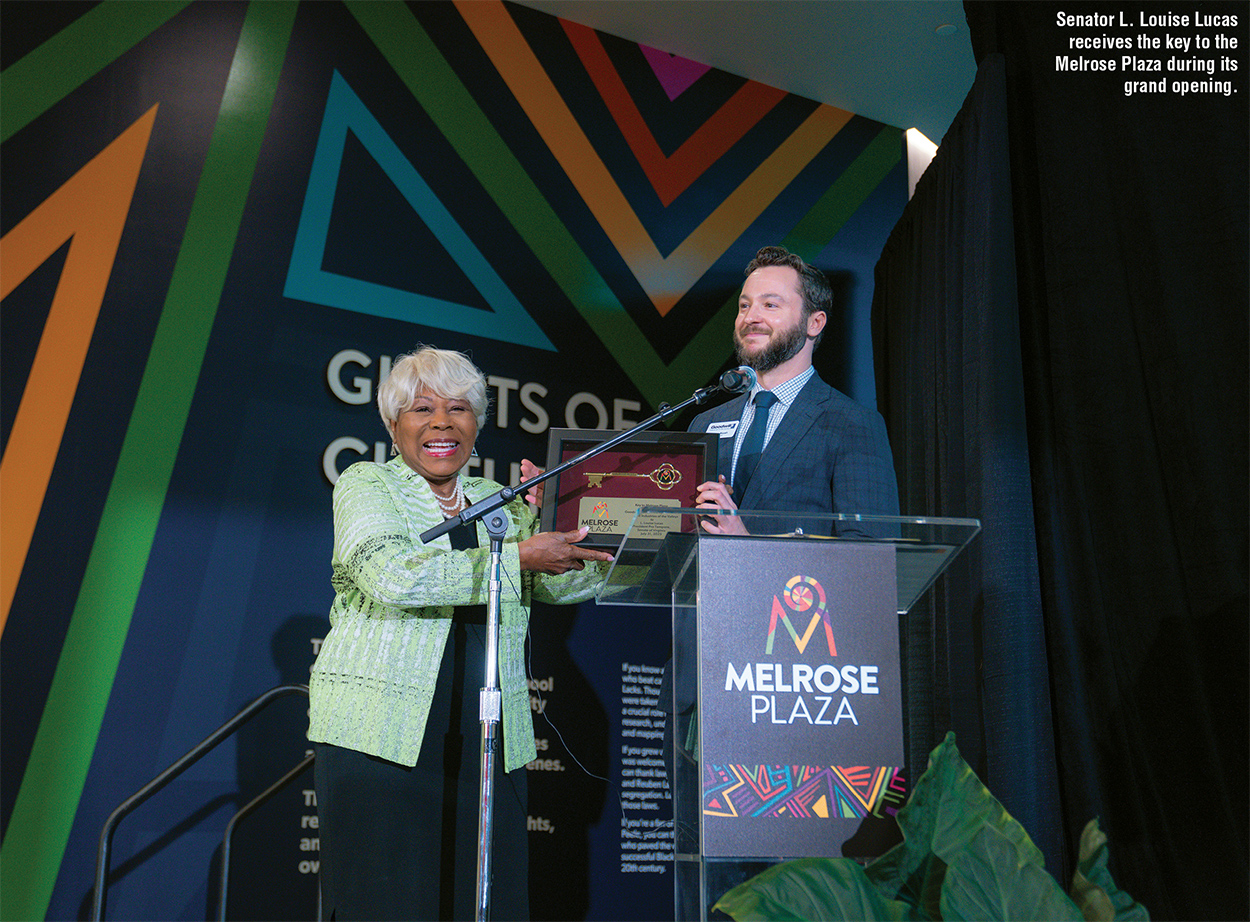Virginia Capitol Connections Magazine
Current Issue

A New Option for Adult Education:
The Story of the Excel Center at Melrose Plaza
By Goodwill Industries of the Valleys
 In the heart of Northwest Roanoke, a transformative initiative is taking shape—one that promises to impact the lives of countless individuals and uplift an entire community. This initiative is the Excel Center, Virginia’s first adult high school, which officially opened its doors on August 25, 2025. The Excel Center is a cornerstone of Melrose Plaza, a first-of-its-kind community resource center that aims to address the social determinants of health in a historically underserved community.
In the heart of Northwest Roanoke, a transformative initiative is taking shape—one that promises to impact the lives of countless individuals and uplift an entire community. This initiative is the Excel Center, Virginia’s first adult high school, which officially opened its doors on August 25, 2025. The Excel Center is a cornerstone of Melrose Plaza, a first-of-its-kind community resource center that aims to address the social determinants of health in a historically underserved community.
The journey of the Excel Center began in Virginia in 2023, when Goodwill Industries of the Valleys successfully lobbied the Virginia General Assembly to create the first adult high school in the Commonwealth. The Excel Center received bipartisan support from numerous legislators, including—but certainly not limited to—Delegate Chris Head, Delegate Sam Rasoul, and Senator John Edwards. This visionary effort was driven by the belief that education is a powerful tool for breaking cycles of generational poverty and empowering individuals to achieve their fullest potential.
Richmond Vincent, President and CEO of Goodwill Industries of the Valleys, has been a key figure in bringing this vision to life. “The Excel Center encapsulates the true mission and values of Goodwill,” Vincent said. “Students will be empowered, inspire their families and neighbors, and break the cycles of generational poverty.” His leadership and dedication to the community were recognized during the grand opening ceremony of Melrose Plaza on July 31, 2025, where he was honored with the inaugural Sankofa Award for his lasting and transformational impact on community, culture, and generational change.
The Excel Center offers a unique and comprehensive approach to adult education. It provides free high school education with accelerated courses and flexible schedules, making it accessible to adult learners who may have other responsibilities, such as work and family. The school also offers free on-site childcare, life coaching, career and college counseling, and transportation support for students. This holistic support system is designed to remove barriers to education and ensure that every student has the opportunity to succeed. While the Excel Center is new to the Commonwealth, it has been a proven model throughout the nation since 2010 and has graduated more than 15,000 students.
The workforce development aspect of the Excel Center model has generated incredible interest from potential students, as well as community businesses and educational partners. Through a collaborative approach, the Excel Center partners with local businesses, training providers, colleges, and other supporters to create career pathways that allow students to enter the workforce as new employees or to elevate from a job to a career within their current employment. As students graduate from the Excel Center with a standard Virginia high school diploma, they are also expected to earn either a workforce certificate or credential, credits toward post-secondary education, and/or internship experience. The Excel Center proudly serves as a stepping stone to the next level of success for its graduates.
 As the Excel Center prepares to welcome its first class of students, the excitement and anticipation in the community are palpable. Goodwill Industries of the Valleys and Excel Center staff are enthusiastic about the impact the school will have on the community. The Excel
As the Excel Center prepares to welcome its first class of students, the excitement and anticipation in the community are palpable. Goodwill Industries of the Valleys and Excel Center staff are enthusiastic about the impact the school will have on the community. The Excel
Center is currently recruiting its first class of 50 students, who will be the pioneers of this groundbreaking initiative. The positive impacts of the Excel Center on the Commonwealth have already begun, including the creation of new jobs in the Northwest area through full-time employment of a school director, as well as multiple administrative and instructional staff positions.
The grand opening of Melrose Plaza on July 31, 2025, was a momentous occasion that brought together civic leaders, business partners, and state officials to celebrate the realization of this visionary project. The 80,000-square-foot facility houses a variety of resources designed to address the social determinants of health, including educational opportunities, health and wellness resources, social and community context, and economic stability. The Excel Center is one of the key components of this comprehensive approach to community well-being.
The grand opening ceremony featured speeches from notable figures such as Joe Cobb, Mayor of Roanoke; Tony Seupaul, Executive Vice President and Chief Physician Executive of Carilion; Delegate Sam Rasoul; and Virginia Senate President Pro Tempore Louise Lucas.
Lucas highlighted the historic and statewide significance of Melrose Plaza, stating, “Melrose Plaza isn’t just a building, it’s a hub for hope, access, and opportunity. It’s the kind of transformational first that will change generations, and it belongs in every corner of our Commonwealth.”
 Following the ceremony, a community open house allowed residents to explore the various resources available at Melrose Plaza, including the Excel Center, Wellness on Melrose, Henrietta’s Café, and the History Wall. The open house was followed by the annual Music @ Melrose event, which brought the community together for an evening of celebration and entertainment.
Following the ceremony, a community open house allowed residents to explore the various resources available at Melrose Plaza, including the Excel Center, Wellness on Melrose, Henrietta’s Café, and the History Wall. The open house was followed by the annual Music @ Melrose event, which brought the community together for an evening of celebration and entertainment.
Melrose Plaza represents a new model for addressing the social determinants of health in historically underserved communities. Under one roof, it brings together coordinated services that address core community needs, including education, library services, health and nutrition, food access, financial empowerment, and cultural enrichment.
The realization of Melrose Plaza was made possible by a diverse network of civic, business, nonprofit, and philanthropic partners, including the City of Roanoke. This collaborative effort demonstrates the power of partnership and community engagement in creating lasting and meaningful change.
The story of the Excel Center is a testament to the power of education, community, and collaboration. It is a story of hope, opportunity, and transformation. As the first adult high school in Virginia, the Excel Center is poised to make a lasting impact on the lives of its students and the community as a whole. With the support of Goodwill Industries of the Valleys and its partners, the Excel Center is paving the way for a brighter and more equitable future for all.
